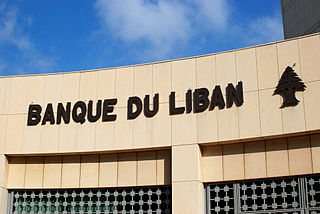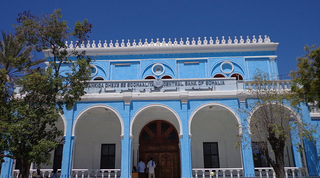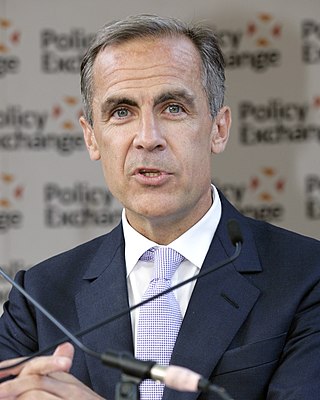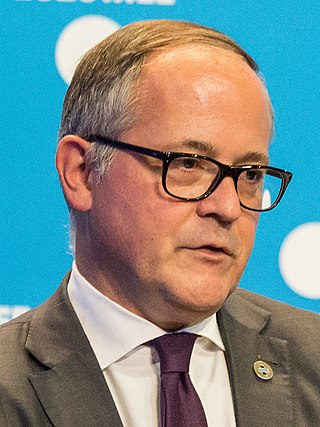
A central bank, reserve bank, or monetary authority is an institution that manages the currency and monetary policy of a country or monetary union. In contrast to a commercial bank, a central bank possesses a monopoly on increasing the monetary base. Many central banks also have supervisory and/or regulatory powers to ensure the stability of commercial banks in their jurisdiction, to prevent bank runs, and in some cases also to enforce policies on financial consumer protection and against bank fraud, money laundering, or terrorism financing.

The European Central Bank (ECB) is the prime component of the Eurosystem and the European System of Central Banks (ESCB) as well as one of seven institutions of the European Union. It is one of the world's most important central banks.

The Monetary Authority of Singapore or (MAS), is the central bank and financial regulatory authority of Singapore. It administers the various statutes pertaining to money, banking, insurance, securities and the financial sector in general, as well as currency issuance. It was established in 1971 to act as the banker to and as a financial agent of the Government of Singapore. The Board is duly accountable to the Parliament of Singapore through the Minister-in-charge, who is also the Incumbent Chairman of the central bank.

Monetary policy is the policy adopted by the monetary authority of a nation to affect monetary and other financial conditions to accomplish broader objectives like high employment and price stability. Further purposes of a monetary policy may be to contribute to economic stability or to maintain predictable exchange rates with other currencies. Today most central banks in developed countries conduct their monetary policy within an inflation targeting framework, whereas the monetary policies of most developing countries' central banks target some kind of a fixed exchange rate system. A third monetary policy strategy, targeting the money supply, was widely followed during the 1980s, but has diminished in popularity since that, though it is still the official strategy in a number of emerging economies.

Bangladesh Bank is the central bank of Bangladesh and is a member of the Asian Clearing Union. It is fully owned by the Government of Bangladesh.

Banque du Liban is the central bank of Lebanon. It was established on August 1, 1963, and became fully operational on April 1, 1964. It has been headed by Wassim Mansouri since 2023.

Quantitative easing (QE) is a monetary policy action where a central bank purchases predetermined amounts of government bonds or other financial assets in order to stimulate economic activity. Quantitative easing is a novel form of monetary policy that came into wide application after the financial crisis of 2007–2008. It is used to mitigate an economic recession when inflation is very low or negative, making standard monetary policy ineffective. Quantitative tightening (QT) does the opposite, where for monetary policy reasons, a central bank sells off some portion of its holdings of government bonds or other financial assets.

The Central Bank of Somalia (CBS) is the monetary authority of Somalia. Somalia has struggled to reestablish a functioning state since the collapse of an authoritarian regime in 1991. Somalia has been cited as a real-world example of an anarchist stateless society and a country with no formal legal system. The Transitional Federal Government, formed in 2004, was recognized as the central government of Somalia. Among other duties, it is in charge of ensuring financial stability, maintaining the internal and external value of the local currency, and promoting credit and exchange conditions that facilitate the balanced growth of the national economy. Within the scope of its powers, it also contributes to the financial and economic policies of the State.
Sir Paul Tucker is a British economist, central banker, and author. He was formerly the Deputy Governor of the Bank of England, with responsibility for financial stability, and served on the Bank's Monetary Policy Committee from June 2002 until October 2013 and its interim and then full Financial Policy Committee from June 2011. In November 2012 he was turned down for the position of governor in favour of Mark Carney. In June 2013, Tucker announced that he would leave the Bank of England, and later that he would be moving to Harvard. He was knighted in the 2014 New Year Honours for services to central banking. His first book, Unelected Power, was published in May 2018 and his second book, Global Discord was published in November 2022.

Mark Joseph Carney is a Canadian economist and banker who served as the governor of the Bank of Canada from 2008 to 2013 and the governor of the Bank of England from 2013 to 2020. He currently serves as chairman, and head of Impact Investing at Brookfield Asset Management since 2020, and was named chairman of Bloomberg Inc., parent company of Bloomberg L.P., in 2023. He was the chair of the Financial Stability Board from 2011 to 2018. Prior to his governorships, Carney worked at Goldman Sachs as well as the Department of Finance Canada.

The Potsdam Institute for Climate Impact Research is a German government-funded research institute addressing crucial scientific questions in the fields of global change, climate impacts, and sustainable development. Ranked among the top environmental think tanks worldwide, it is one of the leading research institutions and part of a global network of scientific and academic institutions working on questions of global environmental change. It is a member of the Leibniz Association, whose institutions perform research on subjects of high relevance to society.
The Governor of the Bank of France is the most senior officer of the Bank of France. The position is currently held by François Villeroy de Galhau, who took office on 1 November 2015.
The Financial Stability Board (FSB) is an international body that monitors and makes recommendations about the global financial system. It was established in Pittsburgh summit,April 2009 as a successor to the Financial Stability Forum (FSF). The Board includes all G20 major economies, FSF members, and the European Commission. Hosted and funded by the Bank for International Settlements, the board is based in Basel, Switzerland, and is established as a not-for-profit association under Swiss law.

Riad Toufic Salameh is a former Governor of Lebanon's central bank, Banque du Liban serving from April 1993 till July 2023. He was appointed Governor by decree, approved by the Council of Ministers for a renewable term of six years. He was reappointed for four consecutive terms; in 1999, 2005, 2011 and 2017. Riad Salameh left his position on 31 July 2023 upon the end of his term, and due to the Lebanese parliament’s failure in electing a new president and forming a new government capable of appointing a successor he was succeeded by his first deputy Wassim Mansouri in an acting capacity

Benoît Georges Cœuré is a French economist who has been serving as President of the Autorité de la concurence since 2022. He previously served as a member of the Executive Board of the European Central Bank from 2012 to 2019.

The Single Supervisory Mechanism (SSM) is the first pillar of the European banking union and is the legislative and institutional framework that grants the European Central Bank (ECB) a leading supervisory role over banks in the EU. The ECB directly supervises the larger banks while it does it indirectly for the smaller ones. Eurozone countries are required to participate, while participation is voluntary for non-eurozone EU member states. In October 2020, two non-Eurozone countries joined the European banking supervision mechanism through a process known as close cooperation: Bulgaria and Croatia. As of early 2021, the SSM directly supervises 115 banks across the Union, representing almost 82% of banking assets of these countries. The SSM, along with the Single Resolution Mechanism are the two central components of the European banking union.

François Villeroy de Galhau is a French civil servant and banker serving as Governor of the Bank of France and ex officio President of the French Prudential Supervision and Resolution Authority since 2015.
Positive Money UK is a not-for-profit advocacy group based in London and Brussels. Positive Money's mission is to promote various reforms of central banks and alternative monetary policy. Its current executive director is geophysicist Fran Boait.
Sustainable finance is the set of financial regulations, standards, norms and products that pursue an environmental objective. It allows the financial system to connect with the economy and its populations by financing its agents while maintaining a growth objective. The long-standing concept was promoted with the adoption of the Paris Climate Agreement, which stipulates that parties must make "finance flows consistent with a pathway towards low greenhouse gas emissions and climate-resilient development." In addition, sustainable finance had already a key role to play in the European Green Deal and in other EU International agreements, but since the COVID-19 pandemic its role is even more important.

Frank Elderson is a Dutch lawyer who has been serving as a member of the Executive Board of the European Central Bank since 2020.














